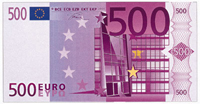Lithuania and Slovenia to hear if they are on track to join European Union's single currency next January
Slovenia is likely to get the thumbs up, making it the first new euro member since its 12 founder members started using the currency in 2002, but Lithuania's high inflation may risk its chances of swapping the litas for the euro next year.

EU finance ministers will take a final decision on the new members of the euro club when they meet on July 11.
EU officials have consistently praised Slovenia, saying it meets all the standards designed to keep the economies of the euro area stable.
But EU Economic and Monetary Affairs Commissioner Joaquin Almunia has warned that Lithuania's high inflation could disqualify it, saying fast-growing countries should reconsider an early target date as efforts to cool high inflation could also hurt their economy's development.
EU nations can only join the euro if their inflation does not exceed 2.4 percent, their annual deficit is limited to 3 percent of their gross domestic product and total public debt is not more than 60 percent of gross domestic product.
Lithuania - one of Europe's fastest growing economies - saw prices rise by 2.7 percent in March 2006 from a year ago. Slovenia saw a slower surge of 2.3 percent.
Another euro candidate - Estonia - has already decided to delay the euro changeover until 2008, giving it more time to tackle inflation running at 4.1 percent. Almunia said last week its decision was "a wise one."
However, Lithuania is confident it can bring down inflation below the cut-off point in less than 10 months, saying its national currency has been pegged to the euro for the past four years.
The euro's strict standards have posed a problem for most countries in the zone. EU leaders bent the rules to allow Italy, Greece and Belgium to sign up for the euro even though their government debt levels were well above 60 percent of GDP.
Since, then Germany andFrance - the euro's two largest economies - have violated the deficit norm and are under orders to return to the fold in the next few years.
Subscribe to Pravda.Ru Telegram channel, Facebook, RSS!




